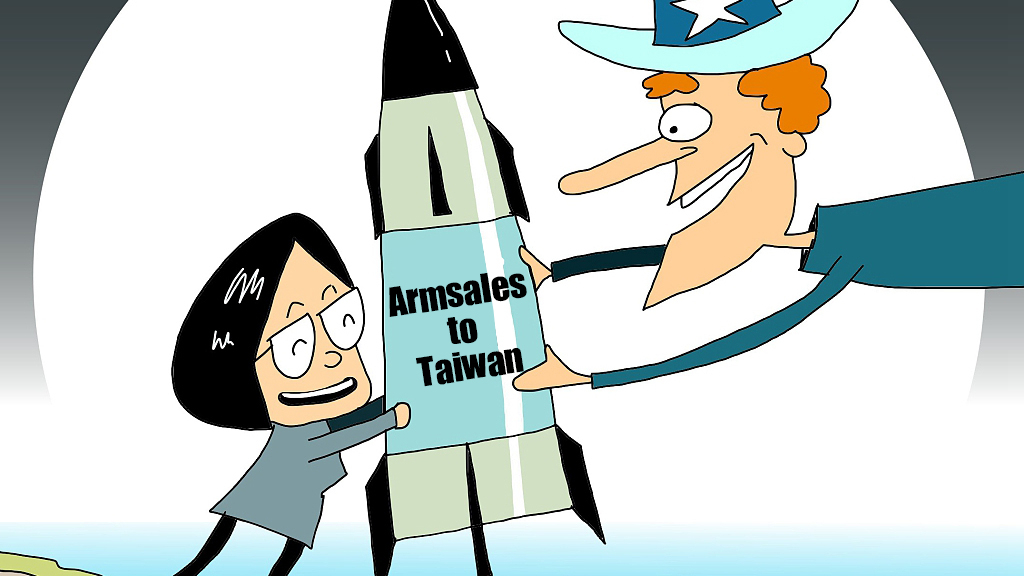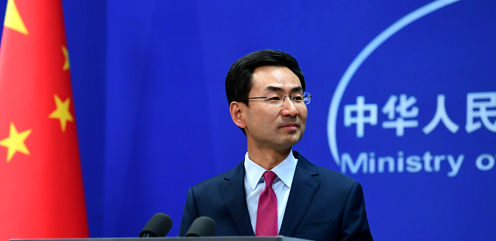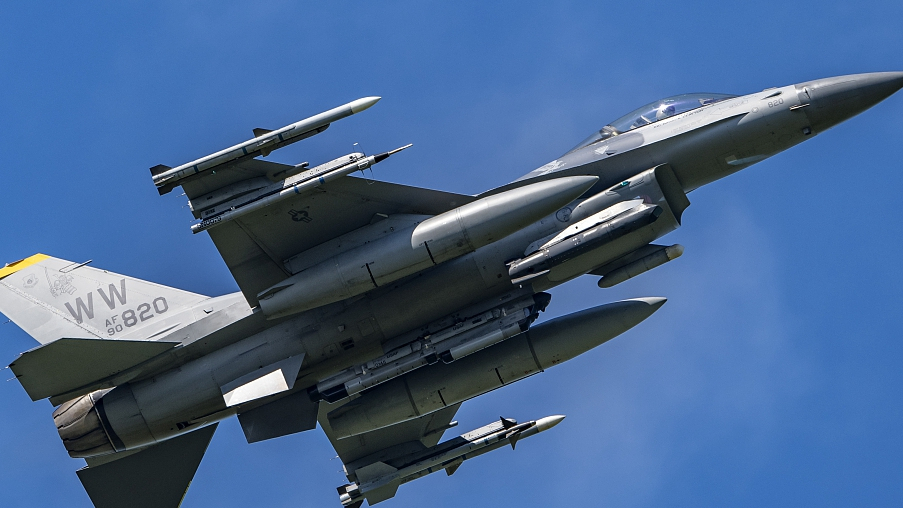
Opinion
15:59, 24-Mar-2019
Why the U.S. has no warrant to weaponize Taiwan Strait
Bobby Naderi

Editor's note: Bobby Naderi is a journalist, current affairs commentator, documentary filmmaker and member of the Writers Guild of Great Britain. The article reflects the author's opinion, and not necessarily the views of CGTN.
The pivoting-to-Asia racketeers, whose belligerence and greed has destroyed the planet beyond repair, appear to be strengthening their hands yet again in the strategic Taiwan Strait.
As if their ill-fated trade war was not destructive enough, President Donald Trump's aides and China hawks in the U.S. Congress have reportedly "encouraged" Taiwan to submit a formal request for purchasing "more than 60 F-16 fighter jets," which might as well include tanks.
As always, this line of thinking hasn't gone so well with Beijing, and from a long-term perspective, Washington's new ploy seems rather short-sighted.
Chinese foreign ministry spokesperson Geng Shuang, in response, has pressed Washington to abide by the agreed one-China principle and the Sino-U.S. joint communiques, stop arms sales and military contact with Taiwan, and refrain from destabilizing the Strait.

Chinese foreign ministry spokesperson Geng Shuang has urged the U.S. not to sell arms to Taiwan. /MFA Photo
Chinese foreign ministry spokesperson Geng Shuang has urged the U.S. not to sell arms to Taiwan. /MFA Photo
According to Geng, "China's position to firmly oppose arms sales to Taiwan is consistent and clear. We have made stern representations to the U.S. We have urged the U.S. to fully recognize the sensitivity of this issue and the harm it will cause."
To be clear, Beijing has real reasons to be concerned about Washington's unnecessary policy of arming Taiwan to the teeth:
The cheery news for U.S. arms manufacturers and Pentagon generals neglects regional political dimensions, destabilizes the Taiwan Strait, sows trouble in the South China Sea and might even heat up a new arms race in a wider region.
As well, it calls into question the U.S.'s "One-China Policy" that some 40 years ago rendered the much-needed rapprochement between Beijing and Washington. The U.S. "acknowledges the Chinese position that there is but one China and Taiwan is part of China." So, it's rather odd for Trump aides to use a 1979 law as a pretext to flood the Chinese island with what they call "arms of a defensive character."
They are taking us for fools. Taiwan's request is doing what it is intended to do. To act as an economic stimulus for greedy American arms companies like Lockheed Martin Corp., Northrop Grumman, General Dynamic and Raytheon.
They want the world's top arms trader to manufacture a new threat and a new crisis in the Taiwan Strait. They would love to hear President Trump shout "all bets are off," and for China and Taiwan to abandon dialogue on their tensions. This way they can sell as many weapons as possible amidst the bedlam and laugh all the way to the bank.
To substantiate, according to the Stockholm International Peace Research Institute (SIPRI), such moneymaking policy is "driven by the implementation of new national major weapon programs, ongoing military operations in several countries and persistent regional tensions that are leading to an increased demand for weapons."
Adding to the concern is the fact that more than half of SIPRI's top 20 weapons sellers are still based in the United States. So, it makes commercial sense for the U.S. government to have a decisive influence on any political row between China and Taiwan.
On this, the decision to encourage Taiwan to purchase American fighter jets and tanks is a plot device for politics and profits. The War Party on Capitol Hill is not at all interested in regional peace and stability; it's not good for the U.S. arms industry and the moneymaking machine.
As such, the Trump aides and China hawks in the Congress are at odds with international law. Despite being perplexed in darkness and entangled in global isolation and chaos, they present themselves as a force for stability in the Asia-Pacific region, while providing material support to destroy it.

An F-16 fighter jet. /VCG Photo
An F-16 fighter jet. /VCG Photo
It's an ill wind that blows nobody good, turning their pivot-to-Asia doctrine and self-absorbed policy of "protecting our factories" and "making America great again" into a destructive race for everyone to the bottom – including Taiwan.
Under international law and the Charter of the United Nations, the Trumpsters not only have the good against them, but also the bad in this new pandemonium.
They know full well that they have no warrant and certainly no reason to weaponize the Taiwan Strait. Worryingly, they also know this is very provocative to China. It will proliferate weapons and contribute to potential flashpoints everywhere.
The solution is not easy but straightforward. The international civil society needs to create a new space in international forums and at the United Nations for a critical debate both on the legality and necessity of U.S. plot to license unwarranted arms sales and military equipment to Taiwan, which could have serious implications far beyond America's own borders in the Pacific.
No doubt the region has avoided a U.S.-manufactured crisis more through luck than through rationality, and sooner or later its luck might run out.
Add in one more thing: Even if we were to accept that the U.S. is providing Taiwan "with arms of a defensive character," the argument that it will help the island defend itself against China's manufactured threat still falls flat on its face.
This destabilizing dogma fails to consider how the "One-China Policy" works. It overlooks the basic strategic concerns of China's regional policy, which is based on peaceful co-existence, non-violence and international law.
Any doubters should take a look at China's foreign relations and strategic thinking guidelines. The fundamental goals of this contemporary foreign policy are "to preserve China's independence, sovereignty and territorial integrity, maintain world peace, and propel common development."
(If you want to contribute and have specific expertise, please contact us at opinions@cgtn.com.)

SITEMAP
Copyright © 2018 CGTN. Beijing ICP prepared NO.16065310-3
Copyright © 2018 CGTN. Beijing ICP prepared NO.16065310-3